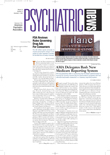In the digital age, anything that can be taped or filmed can be made to last, literally, forever.
And now some of the best speakers at APA's annual meeting are preserved online in the Association's Online Information Library. Clinicians can listen to and in some cases watch lectures and symposia they missed at APA's 2005 annual meeting in Atlanta, Ga., while receiving continuing medical education (CME) credits.
“Because of technological advances, we can now capture the audio and slides of important sessions at the annual meeting, as well as videos of some sessions, and preserve them as enduring materials for those who were not able to attend the meeting,” said Deborah Hales, M.D., director of APA's Division of Education and Career Development.
Hales said even those clinicians who attended the live session and are viewing it online in the “library” for a second time can earn CME credit.
“If you're interested enough to review something again, you can get the CME credits,” Hales said. “There's no penalty for studying something again.”
Access to nine industry-supported symposia from the meeting is free, as is the special two-part symposium “Neuroscience for the Psychiatrist.” APA members can access other materials for a fee of $65, and the nonmember fee is $125.
All of the material in the library is free to anyone who registered for and attended the annual meeting in Atlanta and can be accessed by keying in an annual meeting badge number. Those who attended the meeting but have lost or forgotten their badge number can receive it by calling (703) 907-8666.
Among the stellar presentations that have been preserved in the library are“ Human Psychiatric Disorders: Genetic Models in Mice” by Eric Kandel, M.D.; “Stress and the Mind-Body Connection: Lessons From Neuroendocrinology” by Bruce McEwen, Ph.D.; “The Conflicting Worldviews of Sigmund Freud and Oskar Pfister: Keys to Understanding Patients” by Armand Nicholi Jr., M.D.; “Neurobiological Underpinnings of Psychotherapy” by Glen Gabbard, M.D.; and“ Psychiatry in the Genomic Era” by Thomas Insel, M.D.
Hales said plans are under way to improve and expand the online library, with significantly more material to be added from APA's 2006 annual meeting in Toronto. “We are trying to move our technology into the 21st century to help our members keep up with what they need to know.”
APA's Online Information Library can be accessed at<www.psych.org/amlibrary>.▪
